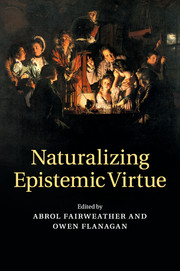Book contents
- Naturalizing Epistemic Virtue
- Naturalizing Epistemic Virtue
- Copyright page
- Contents
- Contributors
- Chapter 1 Introduction
- Chapter 2 Warrant, functions, history
- Chapter 3 The epistemic “ought”
- Chapter 4 Naturalism and norms of inference
- Chapter 5 Indirect epistemic teleology explained and defended
- Chapter 6 Moral virtues, epistemic virtues, and the Big Five
- Chapter 7 Epistemic dexterity
- Chapter 8 Re-evaluating the situationist challenge to virtue epistemology
- Chapter 9 Stereotype threat and intellectual virtue
- Chapter 10 Acquiring epistemic virtue
- Chapter 11 Virtue and the fitting culturing of the human critter
- Chapter 12 Expressivism and convention-relativism about epistemic discourse
- Bibliography
- Index
Chapter 9 - Stereotype threat and intellectual virtue
Published online by Cambridge University Press: 05 April 2014
- Naturalizing Epistemic Virtue
- Naturalizing Epistemic Virtue
- Copyright page
- Contents
- Contributors
- Chapter 1 Introduction
- Chapter 2 Warrant, functions, history
- Chapter 3 The epistemic “ought”
- Chapter 4 Naturalism and norms of inference
- Chapter 5 Indirect epistemic teleology explained and defended
- Chapter 6 Moral virtues, epistemic virtues, and the Big Five
- Chapter 7 Epistemic dexterity
- Chapter 8 Re-evaluating the situationist challenge to virtue epistemology
- Chapter 9 Stereotype threat and intellectual virtue
- Chapter 10 Acquiring epistemic virtue
- Chapter 11 Virtue and the fitting culturing of the human critter
- Chapter 12 Expressivism and convention-relativism about epistemic discourse
- Bibliography
- Index
Summary
Keywords
- Type
- Chapter
- Information
- Naturalizing Epistemic Virtue , pp. 155 - 174Publisher: Cambridge University PressPrint publication year: 2014
- 3
- Cited by

